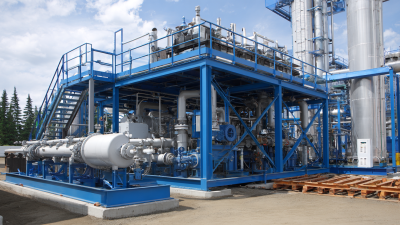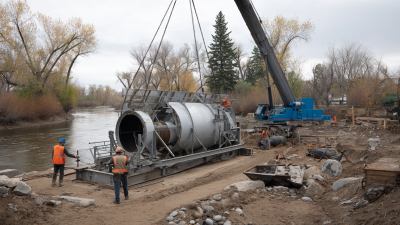strict management, quality first, quality service, and customer satisfaction


You know, when talking about industrial dust collection systems, the Cyclone Separator really takes center stage. It’s pretty crucial for making operations run smoother and keeping things eco-friendly. Shanghai Shangjiang Petroleum Engineering Equipment Co., Ltd. has been leading the way with some pretty advanced cyclone separation tech, especially for the oil and gas world.

I recently read that the global market for cyclone separators is expected to grow quite a bit — and honestly, it makes sense since there's a bigger push for better air pollution controls and tougher environmental rules these days. These systems don’t just do a great job at removing dust and particles from gases; they also help cut down on equipment wear and boost how much product you can recover.
As a top player in this space, Shanghai Shangjiang is all about pushing innovation forward, making sure their cyclone solutions meet the industry's changing needs. They’re not just keeping up—they’re setting new standards for performance and reliability.
You know, cyclone separators are really essential when it comes to improving industrial dust collection systems. They help boost air quality and make operations run smoother. I came across a report from the American Industrial Hygiene Association that said good dust collection can cut down airborne particles by up to 99%. That’s a huge deal because it really lowers the risk of respiratory problems for workers. Basically, these separators work by spinning the air around — using centrifugal force — to kick out dust particles before they get to the filters. This pre-cleaning step not only helps the filters last longer but also saves a bunch on maintenance—like, up to 30%, according to Dust Collection Solutions. Pretty impressive, right?
And it doesn’t stop there. If you look at industries like woodworking or metal fabrication, which produce tons of dust, cyclone separators are a game changer. The EPA did a study that showed systems with these devices can trap over 95% of the dust. That’s not only good for following environmental rules but also makes the workspace cleaner and more pleasant for everyone. When dust is under control, productivity tends to go up, and employees tend to be happier too. So, by hooking up cyclone separators, industries are not just tackling dust issues—they’re also chipping in to make everything run more efficiently and safely.
Cyclone separators are actually pretty important when it comes to improving industrial dust collection. They’re especially handy compared to those old-school filter systems. One big thing to note is how good they are at dealing with high levels of dust—like, they really handle it well. I recently came across some new research on these transverse cyclone cartridge filters, and honestly, the improvements in dust removal are pretty impressive. It just shows how adaptable cyclone tech is, especially in tough environments where there's a lot of dust being kicked up all the time.
What's also interesting is that designers are coming up with smarter cyclone setups. For example, some of the newer, more compact designs are optimized for filtering natural gas—kind of a sign that the trend is towards making these systems not just more effective, but also more practical. Cyclones can move a ton of air without making things harder on the system—they keep a low pressure drop—which makes them a more eco-friendly choice compared to traditional filter setups. All in all, it looks like industries are starting to focus more on balancing cost, performance, and environmental impact, and cyclone separators are definitely playing a big role in that shift.
You know, cyclone separators are pretty much essential when it comes to making industrial dust collection systems work better and more cost-effectively. They really help cut down on maintenance expenses and reduce the amount of downtime machines have to sit idle. I read a report from the Environmental Protection Agency that said facilities using cyclone separators can see a drop of up to 30% in equipment wear. That means fewer repairs and less frequent parts replacements, which adds up over time. For industries like woodworking and metal fabrication—where dust management is a big deal—that’s led to roughly 15% savings on overall operational costs each year. Not too shabby, right?
And here’s the thing: upgrading to more advanced cyclone tech doesn’t just save money—it also boosts how efficiently your system runs. Studies have shown that companies that switch to these newer systems often experience about a 25% jump in overall productivity. Why? Well, with less time spent fixing or checking on dust collectors, workers can stay focused on their core tasks. That's a win-win if you ask me.
If you're thinking about choosing a cyclone separator, a couple of tips—look into things like airflow capacity and how well it handles different particle sizes. And don’t forget, doing regular maintenance checks makes a huge difference. It keeps your system running smoothly and helps you keep enjoying those long-term savings from less downtime and fewer repairs.

Cyclone separators are pretty essential when it comes to boosting dust collection in various industries. You know, in woodworking shops, food processing plants, and metalworking factories, these little guys really do a great job capturing airborne dust and debris. They're a big help in keeping the workspaces cleaner and making sure companies stay compliant with health regulations.
It’s pretty eye-opening—according to the EPA, poor dust management can actually cause workers to develop respiratory issues, which just shows how important it is to have reliable dust collectors like cyclone separators in place.

In the pharmaceutical world, keeping everything sterile is a must. That's where cyclone separators come in—they remove tiny particles from the air without adding any contamination. This is super critical during manufacturing. A study from the International Journal of Industrial Environment mentioned that using cyclone separators can boost dust collection efficiency by as much as 95%. Not only does this help keep the products pure, but it also protects the health of the workers.
And let’s not forget mining—these systems are key for controlling silica dust, which we all know can cause serious lung problems. By using cyclone separators, companies can cut down on workers’ exposure and actually make the workplace safer, all while sticking to strict occupational safety rules.
You know, cyclone separators are pretty much essential in helping industries stay on the right side of strict environmental rules about air quality. The EPA, for example, points out that particulate matter—those tiny specks in the air—is a big deal when it comes to pollution. So, industries need to keep their emissions in check to protect both our health and the environment. These separators are pretty good at catching the bigger particles before they escape into the air — they can filter out particles larger than 10 microns with about 95% efficiency. That’s why they’re super useful in all kinds of industries, like woodworking shops, foundries, or food processing plants.
Bringing cyclone separators into your dust collection system isn’t just about ticking boxes for compliance — it also saves money in the long run. I came across a study by the American Industrial Hygiene Association that showed companies using cyclone tech saw a 30% drop in respiratory issues related to dust among their workers. That’s a pretty clear sign that they’re not just helping the environment but also improving workplace health. Plus, with more focus than ever on sustainability and keeping things eco-friendly, cyclone separators are a solid way for industries to boost their air quality management while making sure they follow all the rules.
: Cyclone separators are used to enhance dust collection systems by improving air quality, capturing airborne particulate matter, and promoting cleaner working environments across various industries.
Cyclone separators utilize centrifugal force to separate dust particles from the air stream, capturing larger particles before they reach filters, which prolongs filter lifespan and reduces maintenance costs.
Cyclone separators can achieve dust capture efficiencies of over 95%, significantly reducing airborne particles and lowering the risk of respiratory issues among workers.
Cyclone separators handle high concentrations of dust more effectively than traditional filters, providing high throughput with low pressure drops, making them a more sustainable option for dust management.
Cyclone separators are commonly used in woodworking, food processing, metalworking, pharmaceuticals, and mining industries to capture dust and ensure compliance with health regulations.
In the pharmaceutical industry, cyclone separators help maintain a sterile environment by removing fine particles without introducing additional contaminants, thus safeguarding product quality.
By managing silica dust, which is a known health hazard, cyclone separators significantly reduce exposure levels, contributing to a safer workplace and ensuring compliance with occupational safety regulations.
By promoting cleaner working environments and reducing health hazards associated with dust, cyclone separators can lead to increased productivity and improved employee satisfaction.
Cyclone separators can reduce maintenance costs by up to 30% due to their ability to prolong the lifespan of filters.
Cyclone separators help industries comply with environmental regulations regarding dust management and occupational safety standards to protect worker health.
Cyclone separators are pretty much essential when it comes to making industrial dust collection systems work better. They’re really good at pulling particles out of the air stream, and honestly, they beat traditional filters in many ways. Not only do they improve efficiency, but they also help boost overall performance. Plus, they save a ton of money in the long run because they cut down on maintenance and downtime, which is a big plus for many industries.
As industries push to meet tighter environmental regulations, cyclone separators come in clutch. They help companies stay within air quality standards and keep operations sustainable. And it’s pretty cool—especially with companies like Shanghai Shangjiang Petroleum Engineering Equipment Co., Ltd.onten pushing the envelope with new and improved cyclone separator designs. They’re constantly working on innovative solutions to meet the ever-changing needs of the oil and gas world. All in all, these systems play a huge role in keeping things running smoothly while also being kind to the environment.






